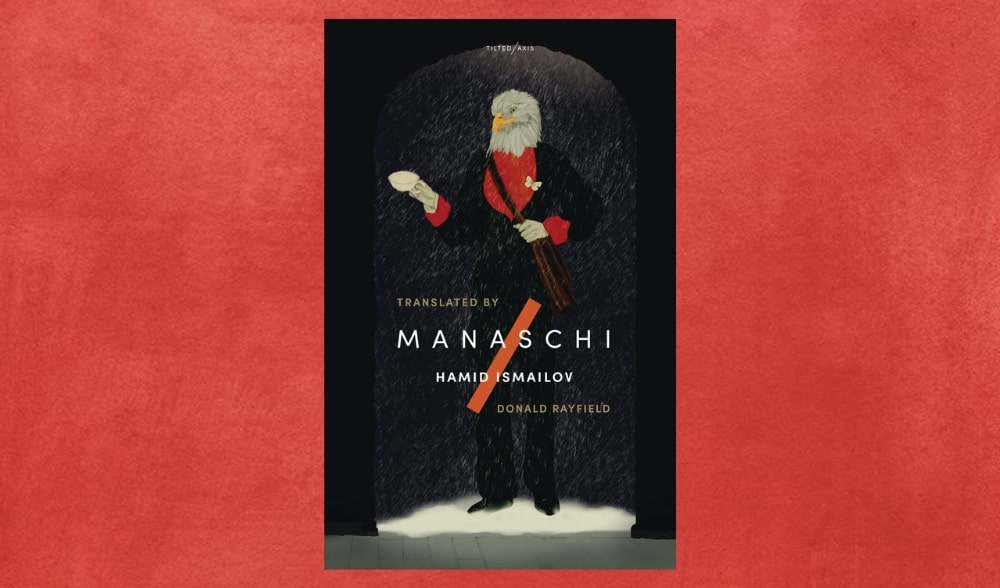ALEC FARMER WRITES – Cultures are founded upon the ancient practice of spoken histories. It was the task of great storytellers to keep the narratives of their people alive and pass them on to future generations. While these stories may have been told by their respective cultures for hundreds of years, they often hold truths that impact their people today. For example, the epic tale, Manas, holds tremendous cultural significance for the Kyrgyz people. The story of Manas and his family has been passed down through spoken word for many generations in Kyrgyz history as a celebration of the people’s military, political, and cultural accomplishments. This oral tradition of reciting Manas is a responsibility held by the Manaschi, the central figure in Hamid Ismailov’s new novel.
Manaschi (2021) is Ismailov’s most recent novel translated into English. Like much of his previous work, Manaschi takes place in Central Asia; this novel takes us to a small mountain village bordering Kyrgyzstan and Tajikistan. While Ismailov is an Uzbek author, his works have dealt with many countries and peoples from Central Asia, unveiling the interconnectedness of Central Asian societies. These culturally specific nuclei allow Ismailov to point out the dualities and complications found in Central Asia that are inherent to the human condition. For the novel Manaschi, Hamid Ismailov chooses to focus on this timeless and poignant Kyrgyz oral tradition.
We follow Bekesh, a radio host who travels to his rural hometown after his uncle Baisal, who was once a Manaschi, dies. Bekesh then interprets one of his dreams as a Manaschi. A Manaschi is a figure of great importance in Kyrgyz culture. The job of a Manaschi is to recite the epic of Manas. This epic tale comes from an oral tradition and has been passed down in this manner for centuries. However, the epic of Manas is said differently depending on which Manaschi is telling the narrative. Thus, it is a role that comes with great responsibility within the Kyrgyz community. And in the wake of post-Soviet tension, as Bekesh learns to be a Manaschi, he is thrown into the middle of several political, cultural, and ethnic conflicts that mirror the tribulations and journey of the Kyrgyz hero Manas.

Manaschi’s setting of contemporary Central Asia is a politically tense backdrop for this story. The main character, Bekesh, is of split heritage between Kyrgyzstan and Tajikistan. Like the villages which border these countries, Bekesh questions the understanding of his cultural background and those around him. Ismailov explores the hypocrisy in much of the ethnic tension that Bekesh perpetuates when he writes that “You yourself are a mongrel, half Kyrgyz, half Tajik. Didn’t the saying go, ‘A roof you can climb onto is better than a Yurt cobbeled together”.
Like Ismailov’s previous works, Bekesh’s journey is a stark interpretation of the dualities present in Central Asia. Whether it is the conflict Bekesh faces when considering his Kyrgyz and Tajik heritage, the clashing of Islam and Tengrism, or the urbanizing forces of China against these largely rural areas – these conflicts are not black and white. Bekesh often contemplates the complexities around him through a culturally specific lens. He laments, “Didn’t the Kyrgyz say, “If a thief comes from a good family, the head of the family is sinful too?’ His brain was filled with contradictory thoughts.” Thus, just like Bekesh’s internal monologues, the issues in the novel are multifaceted and embedded in the region’s history as they are present even in the original story of Manas. The conflicts in this novel are a repetition of the Kyrgyz’s history passed down through this epic piece of oral literature as “at every step they were comparable with Manas, whether acting or prevaricating, they took their example and model from the Manas, they adapted to it.”
While Manaschi is heavily reliant on its Central Asian roots, as the novel often uses proverbs, specific cultural iconography, and references to the Manas, translater Donald Rayfield does a phenomenal job making this book accessible to non-Central Asian readers. Rayfield’s career with translating prose, poems, plays, and books from Eastern Europe and Central Asia has allowed him to convey these specific pieces of Central Asian culture in a manner that non-native readers can understand. While Manaschi is rich with detail for those familiar with the Manas and Kyrgyz culture, this novel does serve as a very informative starting point for learning about Central Asian cultures and political issues.
Manaschi is a celebration of culture and a cautionary tale concerning the repetition of history, which often leads to cultural tension. As a writer, Ismailov is quite particular in describing the power of words and storytelling. The Manaschis explain that “it’s not us reciting the Manas, but the Manas reciting us, you were saying. The words guide our life onto its path, they manage us,” allowing for a sense of community and wholeness with those around you. However, Manas deals with violence, conflict, and tension and should not be dealt with lightly as “reciting the Manas… is like setting off on a very narrow track in the mountains. It is very hard to cross the slope, the path is so narrow and runs along an abyss, there are forty ravines all around! I’ve seen a great number of those who fell.” Ismailov does not offer any straightforward resolutions to the conflicts, tensions, or dualities that he brings up concerning this region of Central Asia as there are no easy solutions. Instead of offering a simple binary, Ismailov chooses to reinforce just how powerful stories are and how they will continue to shape our world.

New AMI book reviewer, Alec Farmer, recently graduated from LMU with a degree in Film and TV Production and a minor in Asian and Pacific Studies. He has studied contemporary Asian literature and cinema.
Edited by book review editor-in-chief, Ella Kelleher.

